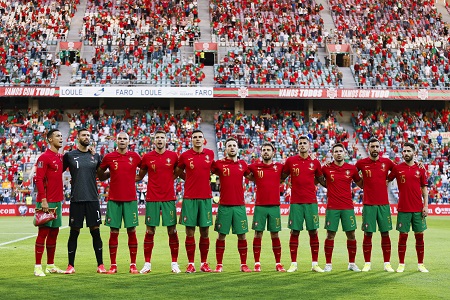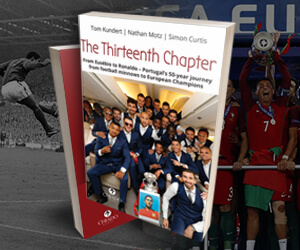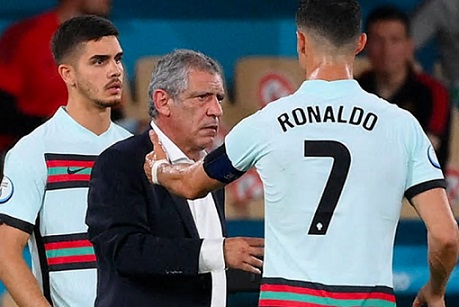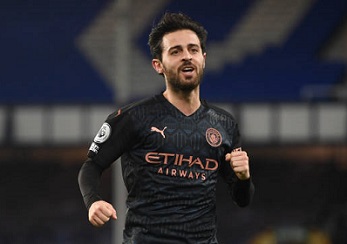 Refining expectations as gauntlet approaches
Refining expectations as gauntlet approaches
Portugal, No.8 in the world according to the latest FIFA rankings, are in a major tournament qualification playoffs for the fifth time in the last seven campaigns.
Much of what came before the Serbia debacle has been loudly discussed already. To the extent the emotions surrounding this tragic event have proven so asphyxiating I feel it beneficial to establish context before even attempting to elucidate the path ahead. Misguided expectation-setting is at the root of fandom misery, and much of this can be avoided.
Our beloved Seleção is rarely as good or as bad as we imagine them in the fantasy world of our expectations which evince not an objective portrait of reality, but the image of our own emotional constitution. Are we not all worried wrecks or dangerously over-confident depending on the success of Portugal’s most recent endeavors?
In summary, Portugal have been dreadful in part because Fernando Santos’ tactics and ability to influence players had all but evaporated by Euro 2020 if not well before. Key players underperformed, and the ability to execute the general function of a team – for individuals to operate together as a cohesive whole – was conspicuously absent.
But Portugal has, in very different times with very different managers and tactics, found themselves in much the same circumstance. Caught between major tournament glory and abject failure. It is vanity to declare it, but it is a fact which challenges our woeful recounting of the current Seleção: awful though they were at times, Portugal would still have avoided these playoffs were it not for an egregious officiating error, in the age of VAR no less.
So why say it? Because we would all do well to remember Portugal were just that close despite playing some of the worst team football I have ever witnessed in 15 years of Seleção fandom, full stop. Because both this group of players and Fernando Santos are receiving some criticisms for failings which are hardly unique to either of them. Tattered emotions are clouding our judgement of Portugal’s footballing heritage. Love it or hate it, qualifying via the playoffs is in Portugal’s DNA. It is not unique to Santos, Cristiano Ronaldo, Bruno Fernandes, or any other scapegoat we might imagine. This is the Seleção. How do we cope with this reality?
Please do not misunderstand – the entire group deserves the criticism for which they are rightfully due – but I will not talk about the failure to qualify directly as if the raison d'être was Fernando Santos. Nor will I grumble it was only because of Santos that we fail to qualify through the playoffs, if that be our undesirable fate.
The ugly truth we all know but often fail to recall is that the killer instinct was lacking well before Santos ever darkened the Portuguese Football Federation’s door. Speaking of whom, there is a book which thoroughly reveals the FPF’s historical role in shaping Portugal’s major tournament fate before the event ever took place. I know - I helped write it.
Moreover, some have insinuated our playoff assignment is an irrelevance – on account of our certain doom at the tournament finals should we progress. But consider Portugal’s qualification record has been deceptively poor at predicting its tournament finals outcome. In some cases we have been excellent at the tournament proper – see Euro 2012 and Euro 2016 after qualification via the playoffs. In others not so much, see World Cups 2010 & 2014. World Cup predictions based on qualifying record are hit and miss, a conjecture which holds empirical validity no matter which nation you evaluate in this manner. England excel in qualifying, but only occasionally follow through with a brilliant tournament run – see World Cup 2010 vs Euro 2020. Poland won its qualification group for Euro 2008 ahead of Portugal then finished rock bottom of Group B at the finals. The Netherlands utterly dominated their Euro 2012 qualifying group then lost all three group matches in Ukraine. Croatia finished runners-up at the 2018 World Cup having been forced to book their ticket via the playoffs. Denmark won Euro 1992 when they were called up to replace Yugoslavia because of political turmoil in that country. They had initially failed to qualify whatsoever.
This is not to say woes in qualification reveal nothing, however, only that it is important to derive the right conclusions. Predicting the future in any scenario is a highly dubious affair.
Finally, an attitude which has festered amongst Portugal supporters for years must be questioned. There is a palpable sentiment we are somehow “too talented to struggle” with qualification. That only lesser nations struggle. That we have emerged from the ranks of the ignoble footballing proletariat into the bourgeoisie class with all of the associated luxuries – as if great teams ought not be troubled by the petty woes of qualification. These speculations are little more than a distraction, ladies and gentleman, and a pretentious one at that. It is not only factually incorrect to say great squads do not struggle in qualifying – as they occasionally have throughout history - but arrogant, and very much beside the point:
Portugal is struggling.
When it became fashionable to quibble in this manner – I do not know – but it reflects the modern regard toward the nature of struggle in general: someone else should struggle, not me nor my people, teams, ideological groups, etc, whom I hold dear.
Struggle is at the very heart of the great human endeavor. Our pathological affiliation with struggle is ineradicable. It is quintessential to our species and endemic to the sport of football – one of the reasons it is cherished the world over. The epochal hero versus villain allegory would romance precisely no one and have no meaning whatever were it not for the chaotic friction and unpredictable throes of fate which elicit the courageous undertaking.
Italy won the Euros five months ago – undefeated in 7 matches and emerging from a group containing Switzerland, the very team who just denied them direct qualification. Are we not entertained?
In football, or in life, and especially for the Seleção, there is no easy, and there is certainly no privileged passage. My feelings Portugal ought not struggle are real - and ignorant of reality. We do struggle. To a degree much larger than I might like to admit, this is normal. Now, what is to be done about the rest?
Portugal has never been less ready for the daunting gate through which they must pass: the playoffs. The final crucible. Struggle may be normal, but the self-inflicted wounds have become too serious, and this national team is bleeding out on the table.
The details: WCQ Playoff Semifinal – Portugal vs Turkey, 24 March 2022
But let us be eyes-wide-open about this, shall we? Portugal’s playoff semifinal opponent, Turkey, was a bona-fide mess at Euro 2020, losing all three of its games, scoring only once and conceding eight goals. In Group G of World Cup qualifying, they scored 27 goals and conceded 16 in 10 matches – Gibraltar made up the 6th team in that group. Going back a bit further, in UEFA Nations League play, Turkey were relegated to League C after finishing below Hungary, Russia, and Serbia. Even so, many neutrals had still been optimistic about Turkey emerging as a Euro 2020 black-horse because of the opening two matches of World Cup qualification – a stunning 4-2 victory over the Netherlands in Istanbul, and a 0-3 drubbing of Norway played at a neutral location in Spain due to COVID policies.
Top scorer Burak Yılmaz is one of the oldest players in a side which boasts few household names except perhaps Hakan Çalhanoğlu of Inter Milan. The squad consists largely of Turkish Super Lig talent in midfield and forward while the defense is more international, anchored by the central defensive pairing of Atalanta’s Merih Demiral and Leicester City’s Çağlar Söyüncü.
But what many people want to know is the historical head-to-head between Portugal and Turkey. It feels like a comforting ritual to confirm or deny fears in this manner, but a few cautious reminders: Portugal had never beaten France in a competitive fixture prior to Euro 2016 – and we all know how that turned out. A month ago Serbia had never beaten Portugal - ever, in 7 attempts - and we all know how that turned out.
But here it is: Portugal have won 6 and lost 2 all-time vs Turkey, winning the last three competitive fixtures including a 2-0 victory in the opening match of group play at Euro 2008. The last time these two sides met was in a friendly over 8 years ago when Turkey beat Portugal 1-3 at the Estádio da Luz in the Euro 2012 send-off match.
But none of this has me convinced either way. Here are three reasons I believe Turkey have it all to do against Portugal.
- Inconsistency. While it is true Portugal drew a talented opponent capable of surprises, I was content with this draw because of all the unseeded teams, Turkey are the most incoherent. There is nothing particularly electric or dour about this side yet nearly every match they churn out an unexpected result. After the disappointment of the Euros, Turkey were dismantled 6-1 by the Netherlands in Amsterdam. There is a sense of lacking cohesion and generic underachievement across the board, even from its talented players. Turkey struggled mightily just to be here, but their track record is less incremental progress, more blind chaos. There is being a wild card in the romantic sense of mercurial unpredictability and danger, and there is just being a wild card. Turkey are in the latter category.
- Turkey allows a lot of goals. Poor defense is deadly in a one-off such as this. It is also an encouragement Turkey do not employ a 3-man backline. The 3-5-2 and 3-4-3 formations Portugal have faced recently gave us a lot of problems. Latvia scored four times against Turkey across both matches in World Cup qualifying - the Netherlands scored eight. It helps knowing Portugal will not be facing a side with an airtight defensive structure.
- Low confidence after Euro 2020. Turkey only just squeezed back into the playoff picture as a result of two events: Erling Haaland’s injuries ruling him out for Norway in critical matches, and a penalty converted in the ninth minute of stoppage time(!) by Yılmaz to secure three crucial points against Latvia. Turkey got the points it needed, but will now face a completely different type of opponent in Portugal where expectations ramp up urgency for this squad to perform. Serbia has already humbled Portugal, now they are ready to make amends against a Turkish side which is very fortunate indeed to be in the playoff at all.
Now I know what you are thinking – “these three reasons are all true of Portugal too!” And that is why this will be a fascinating tie. No amount of talent can overcome the scourge of incohesive play as we have all born witness. But Turkey is the quality of team we should compete well against. They are indeed much like Portugal – capable of far more, but rarely delivering. As bad as Portugal are playing right now, no match would have been easy. But Turkey are about as reasonable an opportunity as we could have wanted.
What we can control
The inevitable limiting factor to this approach is we have no idea which version of Turkey is going to show up. The question for Portugal should never be about the opponent. It is - writ large - how can they ever reassert the moxie of old?
When was the last time you saw Portugal dominate a respectable opponent? For me, it was June 9, 2019 when Portugal manhandled the Netherlands in front of a packed house at the Estádio do Dragão. The result, a modest 1-0 scoreline to secure the inaugural UEFA Nations League title, was never in doubt. Since then - the mettle to persistently force the issue – gone. The tapestry of incisive passes woven together by players full of conviction – missing. And even though the match-winner was Gonçalo Guedes, a more traditional winger, the days of rampaging Portuguese wing sensations are an anachronism. No, our strength that day emanated from central midfield.
I do not have time to analyze more carefully so I will float this out for your consideration – after the 2019 UNL final, William Carvalho’s form deteriorated and Portugal’s midfield has never been the same. We ran a double pivot, of all formations, and made it work because of William. His unorthodox, lethargic tempo was countered by Danilo, the two achieving that mystical resonant frequency so uncommon in Portugal’s midfield today. William stitched together many of our best attacking movements with his eye for the right pass, but he could rumble past defenders too – our very own Velvet Tank.
Since then? Staccato passing sequences. Players whose instinctive vision for where to be and when to be there– their internal telemetry – misguided, broken, scarcely reminiscent of their capacity at club level.
Now when I look at Portugal I see this: two legends - one at either end of the pitch upon whose shoulders rests far too great a burden - one great fullback, one really good central midfielder and an assortment of genuinely talented, but desperately misfiring spare parts. No need to fill in names, you know who I am talking about. The optics, the spectacle, is terrible, but for the last two years, unlike in some of the earlier matches of Santos’ tenure, the results are lacking as well.
 William is off his game and Portugal need a metronome. Renato Sanches is just that, but he is suspended. Bruno Fernandes cannot do it alone. Bernardo Silva belongs centrally, but who will partner Ronaldo? Diogo Jota was atrocious against Serbia.
William is off his game and Portugal need a metronome. Renato Sanches is just that, but he is suspended. Bruno Fernandes cannot do it alone. Bernardo Silva belongs centrally, but who will partner Ronaldo? Diogo Jota was atrocious against Serbia.
Without strength and finesse in midfield, we cannot protect our backline and we cannot create opportunities for Ronaldo and others. This was so clearly exposed again, in a significant match, by Serbia. We were lost in central midfield and once again Bernardo Silva was forced to drop deep to collect the ball. Portugal must find harmony in midfield. It takes more than raw talent. We need to eliminate dissonance by axing the 4-3-3 and unleashing Bernardo as a central midfielder. Or go 3-5-2 and allow Guerreiro, if fit, and Nelson Semedo to give us the width Jota and others cannot provide.
Need me to just say it?
The FPF’s decision to retain Fernando Santos may well have been fatal to Portugal’s World Cup qualifying ambitions.
There.
But none of us can control that. Neither can the players. Hope is still a good thing, and might be the only thing we can control in this case – our decision to believe it is still possible. The talent is there even without Renato and João Cancelo. It is time for the players to take the bit between their teeth, transcend the lamentable circumstances of the present, and seize passage to the World Cup regardless the inexcusable hand which they have been dealt. Hope rectifies despair, and I look to Cristiano Ronaldo to prove just one more time that I and everyone else is wrong – that this disjointed, dispirited collection of exotic talent – can make a way where there is none.
If Portugal beat Turkey, we all know what comes next. There is no need to get ahead of ourselves, but if we somehow progress the nature of the conversation about these playoffs changes quite a lot. Let us save that for the appropriate time, should it come our way.
---
In the fascinating melodrama of a small nation competing against big odds, Portugal are at the stage of the narrative where all has broken down and hope is scarce. No matter the outcome of these playoffs, some of Portugal’s key problems will remain. Yet these WCQ playoffs will likely prove a watershed moment in which Portugal either slip into obscurity or initiate a renaissance. But my money is on the latter. The post-Cristiano era looms large, scintillating talents continue to emerge from the youth ranks, and uncertainties persist for João Felix, Pedro Neto, Renato Sanches, Vitinha, Rafael Leão, and other skillful but yet unproven stars-in-the-making.
The permutations are too many and too great to know exactly what comes next for Portugal, but this should get you started. Until next time…
Força Seleção.
by Nathan Motz